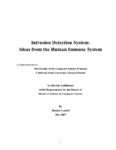- DSpace Home
- →
- Channel Islands
- →
- Academic Affairs
- →
- Masters Theses and Projects
- →
- Computer Science
JavaScript is disabled for your browser. Some features of this site may not work without it.
| dc.contributor.author | Letaief, Hassine | en |
| dc.date.accessioned | 2009-05-20T18:09:26Z | en |
| dc.date.available | 2009-05-20T18:09:26Z | en |
| dc.date.copyright | 2007 | en |
| dc.date.issued | 2007-05 | en |
| dc.identifier.uri | http://hdl.handle.net/10139/625 | en |
| dc.description.abstract | Security has always been a major issue in computers, even more so with the modern systems and the exponentially growing use of the Internet. A well planned security policy and the use of antivirus software make a first line of defense. A second line of defense is needed since, as has been proven over the past few years, it is not a question of “if” the first line of defense is going to be crossed by malicious code; it is a question of “when”. This second line of defense consists of an Intrusion Detection System (IDS). The more efficient an IDS is at detecting real threats, the more robust the overall security of a computer system is. The Human Immune System provides a rich set of promising theories that could be used to help improve the efficiency of Intrusion Detection Systems. Self/Non-Self theory about how HIS detects foreign and malicious bodies is one area that I plan to explore and implement in an IDS application. | en |
| dc.language.iso | en_US | en |
| dc.rights | All rights reserved to author and California State University Channel Islands | en |
| dc.subject | Computer security | en |
| dc.subject | Intrusion detection system | en |
| dc.subject | Computer Science thesis | en |
| dc.title | Intrusion Detection System: Ideas from the Human Immune System | en |
| dc.type | Thesis | en |
Files in this item
This item appears in the following Collection(s)
-
Computer Science [55]

